the







At Johnson CarpetOne Floor &Home, we know how important it is foryou to feel confident in your flooring selection. Therefore,westrivetoensure that the floor we’ve created together,isasbeautifulasthe one in your dreams. If not, we’ll replace it for free. That’s what we call The Beautiful Guarantee®.






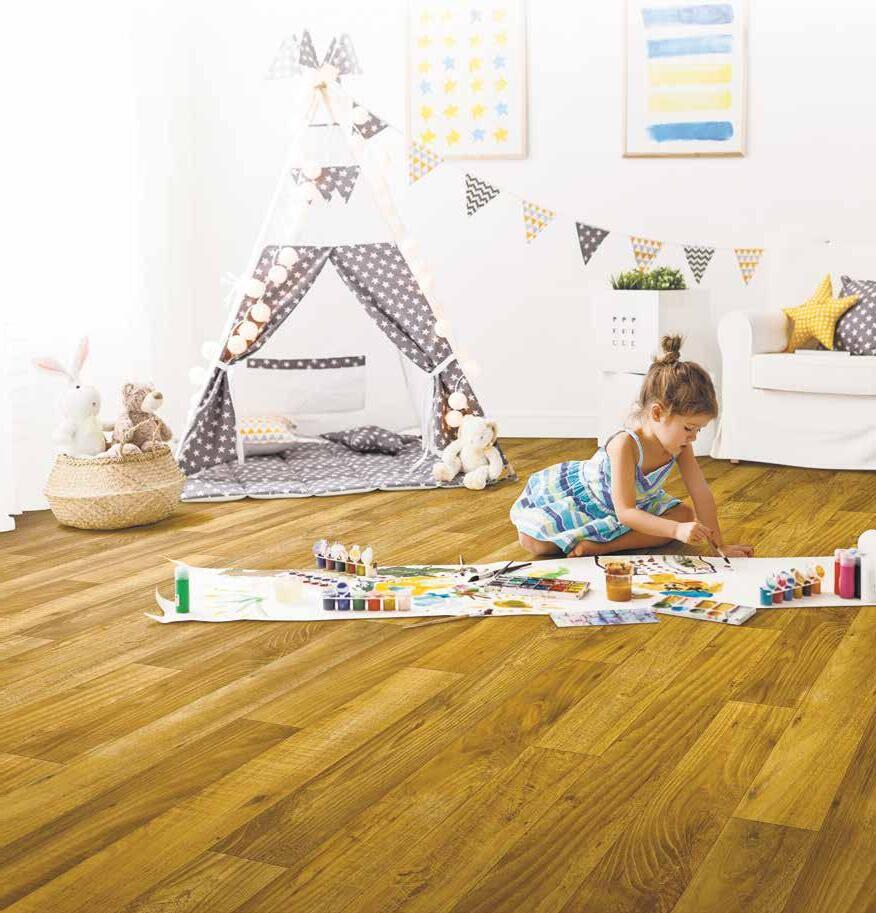



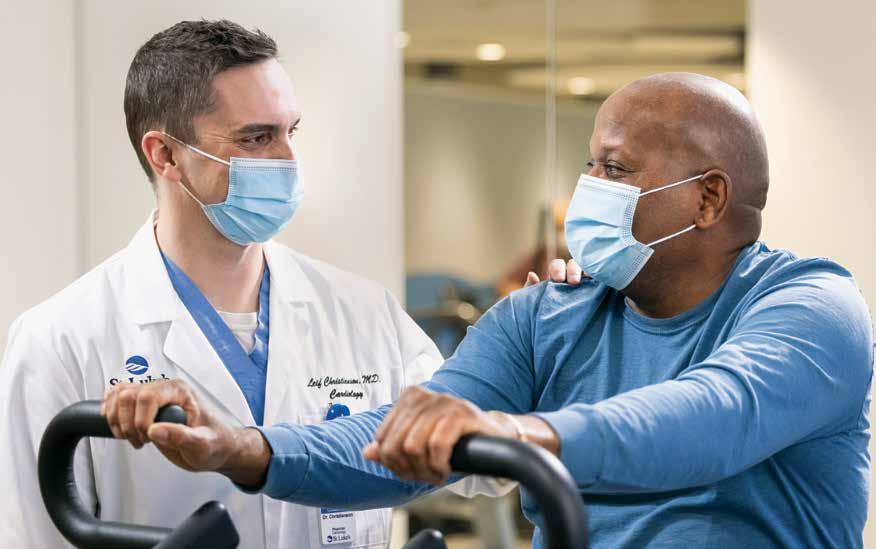
6 Darla Van Heerde
Buzzing in Esko for a quarter of a century
10 Amy McMillan
Living the dream takes work
14 Dr. Verna Thornton
Advocating for women's health care
FEATURES
18 A look at Womens Veterans Day
28 Protect your skin this Skin Cancer Awareness Month

30 Lake Superior divers brave the depths
32 A well planned proposal
34 Next steps in post-pandemic gardening

36 'Living the dream' on the Brule River Farm
49 Introduction to hiking
HEALTH/MEDICINE
22 St. Luke’s
Presevering through a pandemic
26 Essentia
Running through life and adversity
FASHION
24 Fashions by Sam
FOOD/NUTRITION

54 Fish Frenzy
HOME TOUCHES
40 Couple builds new home in the familiar neighborhood they love
DIY
52 Paw Print Flowers
GROUP PUBLISHER
Neal Ronquist
EXECUTIVE EDITOR
Rick Lubbers
ADVERTISING DIRECTOR
Megan Keller
ADVERTISING ACCOUNT EXECUTIVE
Ali Carlson
GRAPHIC DESIGNER
Renae Ronquist
PRODUCTION COORDINATOR
Julie Schulz
Abigail Blonigen
Alison Stucke
Amy McMillan

Andrea Busche
Brule River Farm
Comstock Creative
Darla Van Heerde
Kasha Stoll
Laura Schlieman
Molly Milroy
Molly Ovenden
Morgan Reckinger

Samantha Roffers
Shannon Benolken
Verna Thornton
Western Lake Superior Sanitary District
Tori Billings Photography
Twin Ports Dermatology

The past month has likely been filled with fishing-opener plans. Lines are being strung, oil changed on boats, and tackle boxes packed in preparation for the big Minnesota fishing opener that takes place on May 15. The lakes will be filled with excited and anxious anglers ready to pull that first fish aboard.
Fishing enthusiasts aren’t the only ones chomping at the bit — many gardeners have shovels in hand, ready to toss the first pile of dirt for an incoming plant or seed. I bet many people have their flower pots ready, and gardens tilled.
The popular color for 2021 is cheery yellow, so for all of the gardening artists out there, this will be a fun year to see how many vibrant yellows beautify our Northland homes. I personally love to fill my gardens with beautiful yellow marigolds, geraniums and any other bright cheery colors. Though I want to always start my gardens early, the rule of thumb in our family is to plant Memorial Day weekend, with the hopes that we don’t see any more hard frosts.
If you are in need of some inspiration, we learned about a local gem right here in our Esko community called Pants Mary Land, where she shares her amazing journey on building her beautiful farm. Next we’ll travel east to Brule, Wisconsin, where Sue Ann Dumke shares her story of being a Wisconsin produce farmer and maple syrup making connoisseur.
May 6-12 is National Nurses week. Like so many in the medical field, these extraordinary individuals have been tested in every way this past year. Please take a moment to thank them for what they do in their line of work. We met with Dr. Verna Thornton, OBGYN at Community Memorial located in Cloquet, where she not only shared her story with us, but also noted how nurses in her field are so extremely important.
Have you thought about starting to enjoy the outdoors more, and perhaps entertaining the idea of hiking? In this issue you will hear from some local experts in the hiking field, as they share tips and tricks to help make this new journey an enjoyable one.
I also want to send a Happy Mother’s Day to all of the amazing mothers out there — this day is for you! I, for one, am a proud mother to 12 amazing fur babies (four dogs, two cats, one pig, four horses and a donkey!) that fill my heart with joy and entertainment every day. Sam Roffers (Fashions by Sam) and Ali Carlson (News Tribune multimedia executive) had a very special day with their beautiful daughters, and they were delighted to share that day with us. Ali and I also got to enjoy a very fun DIY project that is hilarious to try with your fur babies.
I hope you enjoy this May/June issue of The Woman Today; we have a delightful selection of fabulous stories to share about extraordinary Northland women. Thank you for picking up this issue of The Woman Today. Our advertisers and team truly appreciate it.
"When you smell a spring flower, it's as if the soul of that flower settles inside you! And then you become that flower for a short time." -Mehmet
Megan Keller Advertising DirectorMurat ildan
WhenDarla Van Heerde, 63, purchased nearly 40 acres of overgrown farmland in Esko, it immediately felt like home. Twenty-five years later, it is literally buzzing. Van Heerde’s sense of adventure, willingness to experiment and visionary attitude allowed her garden to grow into Pants Mary Land farm and apiary.

A retired doctor of family medicine and geriatrics, Van Heerde was raised on a farm in southwest Minnesota. A capable gardener, she chuckled and said she has a “guy” for everything: removing invasive plants, tilling and
cultivating the land, supplying foodie ideas. She works with the United States Department of Agriculture (USDA) through the Natural Resources Conservation Service (NRCS) and Wildlife Habitat Incentives Program (WHIP) cultivating native plants and wildlife and removing invasive species. Boreal Natives, a division of Prairie Restorations, has also helped develop Pants Mary Land. Friends and family have worked alongside her, too.
To know Van Heerde, it is helpful to know who Pants Mary is. Through the Esko Historical Society, writer Davis
Helberg tells the story of Finnish immigrant Mary Winter. She called herself Housu Maija, or “Pants Mary,” because she wore men’s pants to work the land, raising cattle and selling real estate. She was a single woman, financially successful and generous. In 1909, Pants Mary owned Van Heerde’s acreage, so she named it after her to honor a kindred spirit, saying “we’re both working out here wearing pants.”
Visiting Van Heerde’s farm is an experience.
“I love show and tell!” she said with a patient confidence, commenting on
Darla Van Heerde proudly poses — a wild woman without a hood — next to her bees: a nod to Pants Mary PHOTOS BY MOLLY OVENDEN AND DARLA VAN HEERDE.developments: What used to be there and what she hopes for the future.





Van Heerde finished building her house in 2000. In 2004, an NRCS WHIP project built a wetlands restoration pond and Boreal Natives seeded prairie grass around the pond. They regularly schedule a controlled burn to keep native grasses growing and preventing invasive species. Geese return annually, hooded mergansers nest, and sandhill cranes, swans, blue herons, buffleheads, ringneck ducks and many other waterfowl regularly visit.
Van Heerde has a circle of apple trees out front, their variety names etched into bricks at the base of each tree. In 2012, she created more space for apples, cherries, pears, plums, apricots, highbush cranberries, raspberries and blackberries. In 2015, discovering Midwest Elderberry Collective meant planting elderberry bushes. In 2016, attending a seminar at Wrenshall’s Farm LoLa meant learning to grow


Continued on page 8




honeyberries. Applying for a high tunnel through NRCS in 2018 led to tomatoes, cucumbers, green peppers, radishes and microgreens, which, she said, “Pea shoots were the best!” To “have something green and fresh and you know where it came from,” she said, is satisfying knowing it was not “shipped in” from somewhere. Solar panels were installed in 2019, so her electricity bill was $3,259 less the first year. Boreal Natives helped create a pollinator-friendly area between the solar arrays.
A tour of the rest of Pants Mary Land reveals what else is growing: aronia, chokeberry, red currants and jostaberries (a blackcurrant-gooseberry hybrid). Onions, garlic, shallots, grapevines, rhubarb and asparagus do well, too. Celebrating growth, Van Heerde said, “I have the best life ever!”
In 2013, Van Heerde began keeping honeybees. Her “girls,” as she affectionately calls them at Pants Mary Apiary, produced the best harvest yet in summer 2020: about 800 pounds. Van Heerde believes working with the Conservation Stewardship Program (CSP), part of NRCS, to remove the invasive tag alder tree, helped increase honey production because a new field of yellow wetland-loving wildflowers, nodding beggarticks, bloomed where the trees had been; it buzzed with Van Heerde’s girls as well as native bees.
Two weeks of sub-zero temperatures this winter caused Van Heerde to lose eight hives. Although the queen had laid eggs and there were frames full of honey, extreme cold meant they would not break away from the warmth of clustering together. Van Heerde hopes to benefit from a partial reimbursement for

weather-eligible events offered by a NRCS farm service agency program. Van Heerde has learned a lot from nine years as a beekeeper and admits there is always more to learn.



Because the farm yields more food than her family and friends can consume, she brings produce and unique canned goods made from what she grows to sell at local farmers markets. Favorites include garden marmalade (served with Serving
$4695 Per application
salmon) and elderflower cordial (traditional British floral concentrate to dilute with water). Van Heerde’s daughter-in-law uses beeswax to make hand creams and lip balms, and Van Heerde makes intricate candles. Having brewed beer and mead (fermented honey) since the 1980s, she is delighted to collaborate with Duluth Cider by providing honey for their Glensheen Gold Honey Cider.
Going through divorce and the death of her son, Van Heerde felt like the land was truly a “gift from God.” Yet, it was not until her stroke in 2016 that she began to realize what a gift the land could truly be. While she appears pain-free, Van Heerde described the pain in her right cheek as “road rash.” Something as simple as a bedsheet produces the sensation of cutting into her skin. Touching the tip of her right index finger can feel like “shards of glass.” A slight breeze can hurt, too, moving the hairs on her right arm, tricking her brain into perceiving intense pain. Grateful to be able to retire from her medical profession, she has a purpose on the farm and the ability to rest when needed.





“I’m a doer, a grower!” Van Heerde said. D




As a homeowner, veteran, employee, dog mom, and smallbusiness owner, 30-year-old Amy McMillan is living her dream. Her new business, The Minnesota Marshmallow, has been a wild — and surprising — success. And, after serving eight years of active duty in the U.S. Air Force (another one of her long-term goals), she now works full time with the 148th Fighter Wing.

But living the dream doesn’t come easy. It takes a jawdropping amount of effort — a minimum of 18-hour days — to fulfill all of McMillan’s obligations. Yet she soldiers on.
McMillan has many more goals to achieve. Based on her accomplishments thus far, there is no doubt she’ll see every last one through to fruition.
McMillan, who has one sibling — a brother, Josh — was born in Minnetonka, Minnesota. Her mom worked as a nurse and her dad was a car salesman. Her father also served four years in the Marines and, combined with the spirit of patriotism sparked by 9/11, was McMillan’s inspiration to enlist with the military.
“When 9/11 happened, I was in fifth grade and we had several C-130s do a ‘low fly’ over our playground,” McMillan said. “You could tell something big was happening. I went home and talked to my dad about the experience, and I’ve wanted to join the military ever since.”
After graduating from Coon Rapids High School, McMillan signed on with the Air Force. Shortly thereafter, she left for basic training at Lackland Air Force Base in San Antonio, Texas.
During active duty, she lived in South Dakota, Colorado and California and worked in financial management. She also earned two associate’s degrees and a bachelor’s degree.
While stationed in Colorado, she rescued her dog, Lexi, who is now 8. “She’s been my companion ever since,” McMillan
said.
In 2017, McMillan got a job at the 148th Fighter Wing in Duluth. Since then, she has worked in finance, human resources, and now works as an administrative assistant in recruiting. She bought her home in Lakewood Township in 2019.
Marshmallows?
McMillan’s brand-new business, The Minnesota Marshmallow, is a unique one, indeed. She makes and sells a variety of homemade marshmallows — both regular and “boozy” — out of her home. McMillan started her business last year during the pandemic.
“One of my favorite things to do is sit around a fire with friends. And, I believe it’s not a real bonfire without s’mores. I would always add extra toppings — such as fresh bananas and peanut butter — to mine, and I asked myself, ‘Why is there only one flavor of marshmallow?’”
After consulting YouTube to search for recipes, McMillan decided to try making them herself.
“On July Fourth of last year, I went into my kitchen and
made vanilla and strawberry cream marshmallows for the first time,” she said. “I had so much fun with it that I brought bags to the military to share. A friend said, ‘You should start a business.’” Eventually, that’s exactly what she did.
McMillan started by contacting local business owners — The Cupcake Lady (real name: Annie Sitek) in Proctor and Amanda Cunningham and Dean Packingham, owners of Mike and Jen’s Hot Cocoa in Duluth. Both businesses, along with The Entrepreneur Fund, gladly shared plenty of tips about starting a small business, along with all the rules and regulations associated with making and selling food.
She then consulted friend and fellow veteran Jeremy Souders for some help. Souders, who is a tattoo artist, helped her design a logo. It features a delicious-looking s’more with two marshmallow “M’s.”
“I wanted people to see the logo and be able to imagine the product,” McMillan explained.

After setting the stage, things happened quickly.
“My beginning goal was to sell about three batches, so 160 marshmallows, per week,” McMillan said. “But by the time Labor Day weekend hit, I was making 12 batches a night, and was still sold out.
“Today, I make 1,600 marshmallows in a slow week. I get up at 4 a.m. to cut, air dry, and dust the marshmallows from the night before. I work from 7 a.m. to 5 p.m. And then I make marshmallows until 10 or 11. It takes 10 hours to make a batch, from start to finish, and that doesn’t include bagging or adding stickers.”

McMillan believes her marshmallows are a superior product, for several reasons.
“I stand by the fact that I have the freshest product out there,” she said. “It hasn’t been sitting on a shelf.
“And I can customize flavors. My competition doesn’t offer a lot of variety, but I enjoy having a large selection. My goal is to have a regular, year-round menu, plus a seasonal rotation.”
McMillan also takes pride in the packaging and presentation of her product.
Marshmallows can be purchased in bags of 10, or as a variety pack/gift box, featuring 18 marshmallows with up to six flavors. During the holidays, customers can also pick up fourpacks.
McMillan currently offers about 30 marshmallow varieties, with lots of other ideas percolating. Current fan favorites include sea salt caramel, Girl Scout thin mint cookie, Scotch
Continued on page 12
Chata (RumChata, butterscotch caramel, and sea salt), and strawberrywhipped cream vodka, topped with chocolate.

When it comes to the “boozy” marshmallows, McMillan shared, “You can use them to make a boozy s’more or add a punch to your hot chocolate. You can taste the flavor of the alcohol, but you won’t really feel the effects.”


McMillan hopes to add a spicy marshmallow to her repertoire sometime soon.
“I’m thinking of making a mango-chile ‘mallow,” she said. “It would pair well with dark chocolate s’mores.”
The Minnesota Marshmallow has already established several key partnerships. For instance, Vikre Distillery has carried its ’mallows at their Winter Wunderbar since November 2020.

McMillan also recently formed a partnership with Johnson’s Bakery; she is permitted to use their commercial kitchen and equipment, and the bakery uses cut-up marshmallows in a few of their products. McMillan also hopes to someday sell her product in their display cases.
Additionally, several resorts and businesses who wish to partner with The Minnesota Marshmallow remain on a “waiting list,” to be addressed once McMillan has time. While McMillan hopes to add extra staff someday, right now, the business remains a one-woman operation.
McMillan is also completing work on the “Marshmallow Mobile,” which will be used as a mobile food truck. Her five-year dream is to partner with Bentleyville, and her 10-year dream is to have a presence at the Minnesota State Fair.
When she isn’t working, McMillan enjoys spending time with her boyfriend, Chris Thune; dog, Lexi; and friends. She enjoys competitive obstacle course racing, kayaking, and playing volleyball. She gives back by participating in the Bulldog Fitness Combine at the 148th; through charitable giving; and by supporting other small businesses and entrepreneurs.
“When we all help each other and network, it’s a much more positive place to be,” she said. “I’ve been embraced by lots of other small businesses in Duluth, who help keep moving everyone towards their goals.”
Despite the long days, McMillan is grateful to pursue the work she loves.
“It’s a passion and a fire that gets me out of bed at 4 a.m.,” she said of being an entrepreneur and business owner. “This never feels like a job.”
Visit The Minnesota Marshmallow on Facebook to learn more.
How are you doing?
LET’S
CHECK
Scheduling a wellness visit is a simple, easy way to take care of yourself. Whether it’s face–to–face or virtually, we’re committed to providing the right care for you. We’ll listen, assess how you’re doing and get you back on track. Take some time to come and see us—because it’s always good to check in.

Dr. Verna Thornton, a board-certified obstetriciangynecologist (OB-GYN), was born and raised in the South. The eldest of two children, Thornton recalls growing up in the “segregated, but prosperous” neighborhood of Dynamite Hill, located in Birmingham, Alabama, where her family lived among mostly doctors, lawyers and teachers.

Education was of the utmost importance to Thornton’s family. Her father was a teacher, school principal and businessman with two master’s degrees. Her mother was a teacher, college professor and private tutor, whose most well-known pupil is former United States Secretary of State Condoleezza Rice. Thornton’s mother possessed a master’s degree, a law degree and a Ph.D.
So, it’s no surprise that Thornton herself also values a good education. She also knows just how unique she is.
“Every time I operate, I’m grateful for my patients’ trust in my abilities and the privilege of a good education,” she said. “I’m also mindful that, in Duluth, which has only a 3% population of people of African heritage, I’m an enigma; a rarity.
“And, only 2% of physicians in this country are Black women,” she added. “So, I’d like to leave a legacy. I want women of color to see that people like me do exist.”
Thornton has been headed toward a career in medicine from an early age.
“I was an ‘old soul’ type of child, and was the preferred baby-sitter for all my mother’s friends,” she said. “I was very
responsible. I’d watch kids with Down syndrome; kids who had seizures. I felt very sensitive to people with disabilities.”
Growing up, Thornton was intrigued by science.
“I watched open heart surgeries on TV, read National Geographic, watched Jacques Cousteau, you name it. I naturally gravitated to anything with science,” she said.
Despite being accepted to Harvard, Thornton chose to attend Fisk University — an HBCU (historically Black college or university) in Nashville, Tennessee — to the delight of her family. Several of her family members, including grandparents, parents, aunts and uncles, had attended an HBCU. She graduated with a Bachelor of Arts degree in biology in 1983.

Thornton realized she wanted to specialize in obstetrics and gynecology during her third year of medical school at Morehouse School of Medicine in Atlanta, Georgia.
“I knew I liked surgery, and I loved general surgery,” she said. “But as an OBGYN, you are the total health care provider for women and pregnant women.”
~
Dr. Verna Thornton ~
After graduating from Morehouse in 1987, Thornton was matched with Emory University, also in Atlanta, to complete her four-year residency. She graduated in 1991.
Dr. Thornton worked in private practice in Peachtree and Newnan, Georgia, from 1991 to 2004. In 2005, she started her own gynecological practice, which she built from the ground up.
Thornton found herself becoming frustrated with the Georgia health care system around the time of the passage of the Affordable Care Act. “Politics was ruining opportunities to gain access to health care,” she said.
Thornton was ready for a change.
In 2018, she received a phone call from a recruiter, telling her about a job opportunity in Minnesota. She had spent time in the Minneapolis area as a child, but had never been to Duluth.


“I arrived during the middle of a blizzard,” she said with a laugh. “We stayed at Pier B Resort and watched the waves roll in. I interviewed at Community Memorial Hospital (CMH) in Cloquet, and everyone was so warm and nice. I knew somewhere in my heart that this was the right move.”
Ultimately, Thornton accepted the job offer and moved to Duluth, closing her practice in Georgia. Today, Thornton works as a gynecologist at CMH, and also at Essentia HealthMoose Lake a few times per month.
During the height of the pandemic, all elective surgeries were canceled. Thornton continued seeing a limited number of patients in her office. But now, “it’s gangbusters,” she said. “I have four to five cases on my OR days. It’s exhausting, but I love it.”
Over the years, Thornton has worked closely with many nurses and other medical professionals, and considers them vital to her success.
“Nurses are the glue that holds medicine together,” she said. “We owe a great debt of gratitude to nurses of all specialties.”
Dr. Thornton’s patients are primarily age 18 and up, but she occasionally sees children in cases involving trauma, forensics or suspicious moles.
“I recommend that women start seeing a gynecologist either at 18; when they become sexually active; or if they have a problem,” she said.
Thornton handles many gynecological issues, which can be handled in her office or through surgery, including:

• Pap tests.
• Tubal pregnancies.
• Menopause.
• Abnormal bleeding.
• Masses, fibroids and cysts.


• Sterilizations.

• Genital prolapses.





• Reduced libido.



• Pelvic relaxation.
Thornton advises all women to be wary of what they see on TV or the internet, guiding them to instead rely on their doctor’s advice.
“I’ve heard advice about only needing Pap tests every five years, and stopping Pap tests at age 65. None of these TV doctors have a vested interest in your health,” she said. “A physician has a personal relationship with their patient, and can advise what is suitable for you.”
Access to medical care is important to Dr. Thornton.
“So many women in Northeastern Minnesota don’t have access to a board-certified OB-GYN in their area,” she said. “I want to help make sure every hospital, particularly rural hospitals, has someone competent on staff to appropriately care for pregnant women.”
So, together with CMH and the support of its CEO, Rick Breuer, along with financial assistance from Blue Cross Blue Shield, Thornton is spearheading an initiative to offer simulation training to health care providers. Here, they can practice procedures like cesarean sections and breech births using a model. CMH will ultimately be a training site for these simulations.




In addition to her thriving medical career, Thornton participates in a variety of boards and other professional groups. She serves on the Policy Council for the Minnesota Medical Association, and is on the Board of the Foundation for the Minnesota Medical Association.
She is a member of the League of Women Voters, a member of the NAACP, and a member of the American Board of Obstetrics and Gynecology. She is an inaugural commissioner for the city of Duluth’s African Heritage Commission. She is a regular attendee at St. Mark’s AME Church. And she is a frequent speaker for local organizations, such as Kiwanis and Lions Clubs.





Thornton is married to Chuck Sylvester, an attorney. Thornton has a step-son, Jahret, 34, and twin daughters, Denise and Danette, 29.


When she isn’t working, Thornton enjoys international travel, decorating, fashion, plants and gardening. She also considers herself a “regular” at Tavern on the Hill, which is near her home, and enjoys dining there regularly.
Dr. Thornton, who is currently accepting new patients, enjoys working in the smaller setting found at CMH.

Practicing at a smaller hospital helps ensure that she has plenty of time for her patients.




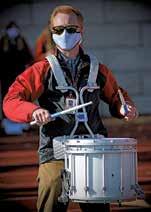


“What’s different about a community hospital is that we’re small,” she said. “That’s good for people who are looking for a personal relationship with their doctor. I’m not rushed. I’m very big on patient education and trust. There is no greater privilege than caring for, and operating on, my patients.
“I absolutely love taking care of my patients,” she added. “That’s why I went into this field.” D

The first Women Veterans Day was held on June 12, 2018, which marked the 70th anniversary of the Women’s Armed Services Integration Act, signed into law by President Harry S. Truman on June 12, 1948. The Women’s Armed Services Integration Act granted women the right to serve as regular, permanent members of the armed services. Every year we see more women stepping into amazing heroic roles in the military. Based on a Google search, women make up a growing share of veterans, about 1.7 million as of 2018. Seventythree years later, we continue to have incredible women who are serving our country. You will have an opportunity to hear stories from Northland military women who are currently serving, and some who are now prideful veterans, in our July issue of The Woman Today. We thank them for stepping forward to share their stories.
After some research in our archives, The Duluth News Tribune team covered a story — “Veterans First: Northland women who served emphasize duty over gender concerns” — on Sunday, November 9, 1997. We have republished that story in this issue of The Woman Today. These are some of many who were the pioneers advocating for women’s equality in the military.
Megan Keller Advertising Director By Daniel Bernard/News-Tribune staff writerOriginally published Sunday, November 9, 1997
Last month, when a national monument was dedicated to women who served in the U.S. military, that word was like a refrain in more than one speech. The Women's Memorial was long overdue, speakers argued.
At each repetition, Dorothy Rust of East Hillside cringed.
"That, I didn't like,'' said Rust, a World War II Navy nurse who traveled to Washington for the ceremonies on Oct. 17-19. "That 'Finally, we get it.' I thought that wasn't necessary at all.''

Standing near her at Arlington National Cemetery was Jean Wicker, who confessed a little discomfort, too. "We went (to war) because they needed us,'' said Wicker, a former Army dietitian from Duluth.
In recent years, discussions of women in the military have tended to run quickly to sexual harassment and discrimination. For Rust, Wicker and 18 other female veterans from Duluth and Carlton County who attended the memorial ceremonies, clashes between the sexes were nowhere near the point.

No denying, they were delighted by the attention from
national leaders, by the tributes from younger women. But local women who served in World War II say they never claimed they were entitled to a $21.5 million monument.
They haven't spent the decades since their military service brooding about the sort of commemoration they deserved, the local women said during a gathering in Rust's living room this month. No more than they worried about their rights as women when World War II was under way, when they were trying to comfort soldiers healing from burns, lost limbs and mental illness.
"We were too busy working,'' Rust explained.
In the Northland, veterans of World War II outnumber those from other conflicts. The 1990 census found that of 46,000 male and female veterans in eight Arrowhead counties, about 17,750 served during World War II. Another 12,500 served in the Vietnam era.
Members of a generation that came of age before the feminist movement can nevertheless appreciate the progress women have made in the military and society at large.
Beatrice Yanda has seen it. Disappointment still comes through in her voice when the World War II veteran talks about moving to Cloquet in 1963 and applying to the local
Veterans of Foreign Wars club. She was turned down because, like many fraternal organizations, the VFW at that time refused membership to women.
"I was overseas. I just felt that I should be able to join, too,'' Yanda said. "We all felt it was our privilege to join, just like the men.''
It was 1978 when the VFW dropped the prohibition. When Yanda heard about the policy change, she left work immediately and went to the post to apply.
But Yanda only attended one meeting. As the only female member, she felt uncomfortable. She started attending regularly only this year when she had company -- a local woman who served in the Korean War and two women who served in the Persian Gulf War. By then, things had changed. One of the gulf vets had just finished a term as the post's commander -- Joy Collins-Baxter of Cloquet, now a regional VFW officer.
Yanda felt entitled to a seat in the VFW hall because of her work in Army field hospitals in England. The mobile hospitals treated people injured by Nazi bombing raids and Allied troops who fell ill during preparations for the D-Day invasion at Normandy. After the invasion began, Yanda served in tent hospitals that received injured soldiers transported back from France.
Another Northland woman followed the invading forces. Like Yanda, Elizabeth "Dolly'' Donahue of Lincoln Park (West End) enlisted as an Army nurse in 1943 and was stationed in England in 1944.

A few months after D-Day troops started the march that eventually pushed the Nazis from Western Europe, Donahue crossed the English Channel in an LST and waded to shore at Omaha Beach. Donahue's unit set up a tent hospital as casualties reached 300 a night.
Continued on page 20
Wh en yo ur joi nt sw ear ou ta nd need re pl ac em en t, co nsi der an inno va ti ve ap pr oach. La ke wa lk Su rg ery Ce nt er no w of fe rs join tr eplac em en tu ti lizing Ma ko Sm artr obo tic s™ te ch nolo gy– en abl in gy ou to ha ve am or ep er sona liz ed and pr ec ise su rg ic al ex perienc e. Ta lk to yo ur sur ge on to see if Ma ko is th er igh to pt ion fo ry ou .

Donahue remembers scrubbing furiously as her unit prepared for inspections by Gen. Eisenhower or Gen. Patton. While working, the nurses usually wore their shirt-and-pants fatigues outfits. But not on Christmas.

"The (wounded) GIs always wanted the nurses to dress in our dress uniforms Christmas Day. They wanted us in dresses,''
Donahue recalled. "And it was cold over there. Well, we did that for them. Boy, I've never forgotten how they enjoyed it. That was more important to me than being cold.

"We probably had long johns on underneath,'' she said, prompting laughter from the group. "But we dressed for them because that was what they wanted.''
As the Allies neared victory in Europe, Rosemary Olson of Duluth's Woodland neighborhood was leaving the United States on a converted luxury liner. Olson had joined the Red Cross and been assigned as a secretary for hospitals in Italy. But, in her words, she "got in late.''

On May 7, 1945, when word came that Germany had surrendered, ending the war in Europe, Olson's ship was in the middle of the Atlantic.
"We wondered if they'd turn around and take us back home,'' Olson said, smiling. "They didn't.''
Olson remembers reading letters from home to patients whose arms had been amputated.
"When they think they may be on their deathbed or (wonder) will they ever get home again, they say different things,'' Olson said. "You do the best to make them feel they're hearing what they want to hear. You read it so it comes out easier.''
As victory in Europe let the Allies focus on Japan, Ilene Pearson of Woodland was in Hawaii working as a typist for a Navy unit that processed film from spy planes. Pearson didn't know how close she was to history when, during a bus trip to a picnic, a sergeant made a sly comment.

"I put two little pinpoints on a map today,'' he said. Where, Pearson asked. The sergeant laughed and said he couldn't say.
"But you know where it was,'' Pearson said. "Hiroshima and Nagasaki.''
Two weeks later, a B-29 bomber bound for the first of those cities took off from Tinian Island, north of Guam. Jean Wicker of Lakeside was on the island, using limited resources to plan meals for a field hospital that served troops preparing to invade Japan.
After the two atomic bombings and Japan's surrender in August 1945, the Army dietitian was stationed just 85 miles from Nagasaki to support occupying forces.
The pins on Elizabeth Donahue's American Legion cap depict the Duluthian's experiences in World War II. The ribbon with three stars represents that she served in the European Theater or front. The staff with wings is the Army medical insignia; the "N" means Donahue was a nurse. And the bar means she reached the rank of first lieutenant. The cap is from the former American Legion Women's Post 590, which met in downtown Duluth but disbanded four years ago for lack of active members. Donahue and other members joined American Legion Post 71 in West Duluth. (News Tribune, 1997)
By 1952, when Faye Thiel went to Japan, the island nation was not a menace, but a docile ally serving as a base for U.S. operations during the Korean War. The Cloquet woman was an Army sergeant for personnel administration and special services, which included arranging transportation for entertainers.
The other thing that had changed, she said, was the moral climate. World War II had clear villains, a clear purpose and an unambiguous outcome. Korea and Vietnam didn't, Thiel said.

At stateside military hospitals, Thiel saw a seemingly unending stream of soldiers coming home crippled by mental illnesses.
"I know the men thought they were doing the right thing. But it just seemed so futile,'' said Thiel, one of the few Korean War vets to make last month's trip to Washington, D.C. "I don't know personally what it accomplished.''
What's changing today for World War II vets is their perception of their own effect on other women.

At a luncheon during the memorial ceremonies, a 34-yearold lieutenant colonel approached the Duluthians' table.
"She said we paved the way for her to go to West Point,'' Donahue said. "She treated us like we were royalty.'' D
 By Claire Kiger
By Claire Kiger
WhenDr. Rachel Gordon chose to become a physician, she had no idea that a global pandemic lay ahead of her. She never could have predicted the effects that COVID-19 would have on our world. In particular, she never would have believed the close encounter she was going to have with this devastating virus personally.
Starting out, she had wanted to become a teacher. However, discovering a particular passion for her science classes changed everything. She transitioned from secondary education to premed and never looked back. After completing residency, she moved to Duluth with her family to begin her practice at St. Luke’s Internal Medicine.

Four years later, the spread of COVID-19 was declared a global pandemic. Shortly after that, Dr. Gordon’s daughter, only a 5-year-old at the time, came down with a high fever. Fortunately she fully recovered, but it wasn’t long before Dr. Gordon noticed a tickle in her own throat.
“It was a Friday morning when I got the call that I was COVID-positive,” said Dr. Gordon. “I sat in disbelief for a while. But then my head went to the worst case scenario. What if I had spread the virus unknowingly? What if I was going to be the cause of some awful outbreak?” She had been following
all the recommended precautions. Still, she feared the worst. She reached out to everyone she had been in contact with at work that week, both colleagues and patients. She had to let them know they could have been exposed. Thankfully, in the end no one contracted the virus from Dr. Gordon and her symptoms were only moderate.
“It was like a bad cold with chest pain,” she said. “I was sick for about a week, lost my sense of smell and had two days where I was pretty knocked out. But eventually I made it through, eager to share my experience. I wanted everyone to know that they needed to protect themselves and prepare.”
Working with an elderly population, she knew it was best for her patients to stay home as much as possible during the early days of the pandemic. So she encouraged them to do just that, even if that meant not seeing her for a while. However, since then things have changed.
“When the pandemic started, it was smart for people to stay away from others. Small health concerns could wait,” she said. “But now we know how to protect ourselves from the virus. It’s been more than a year. It’s time to see your doctor again.”
Some may be planning to avoid medical facilities until they are vaccinated, while others may be holding out for the pandemic to end altogether. However, the risks of waiting could be worse than the risks of contracting the virus.
“As a community, we need to stay as healthy as we can by addressing our health issues while they’re still small,” Dr. Gordon said. “Don’t delay the health care you need.”
For your future at St. Luke’s
Dr. Gordon is encouraged that we are all learning to live with this virus and moving back towards normal.

“St. Luke’s is doing so well at following precautions, and it’s so great welcoming patients back to our clinics and hospitals. Every day I get to see patients I haven’t seen in a while and it’s so rewarding to care for them once again.”
In addition to addressing acute medical issues, it’s also important to stay on schedule with preventative care. This includes annual physicals as well as any cancer screenings you may be due for, like a mammogram, colonoscopy or lung cancer screening. Regular care and screenings both help to ensure a healthier future.

“The end to this pandemic is coming,” Dr. Gordon said, “but it won’t be all at once. It will simmer out gradually and take some time. Until then, focus on taking care of yourself and the people around you. Eat healthy, exercise regularly, continue to follow all the recommended safety precautions, and get the medical care you need.”
Schedule an appointment or establish care at slhduluth.com/schedule. D

Samantha Roffers, a Moose Lake writer, believes it’s important to shop for things you love and feel comfortable in. Everyone’s style is unique and that’s what makes it so special.
 By Samantha Roffers
By Samantha Roffers

dear readers, and welcome back.
If this is your first time reading Fashions By Sam, welcome! I hope you’ve been able to enjoy some of the gorgeous weather we've been having. I can't remember the last time I got a sunburn on Easter!

For this issue of The Woman Today, we decided to honor Mother’s Day. I was lucky enough to have The Woman Today sales representative Ali Carlson, a new mom, join me on this month's issue of Fashions By Sam. We put some adorable “mommy and me” outfits together and captured some great photos. By some kind of divine intervention, all the kiddos cooperated and the weather was beautiful. We ordered our outfits from one of my favorite online boutiques, “Bailey's Blossoms.” They always have a fantastic selection of trendy and affordable baby clothes.
“I was so excited when we first discussed the idea of a Mother’s Day photo shoot, as this is my first Mother’s Day as an official mom,” Carlson said. “This was also our first matching outfit,
too! As we live in Duluth and can never trust the weather, I thought, ‘Better play it safe and do a little bit warmer outfit.’ I found these dresses and thought they would be perfect for Sloane’s blue eyes and red hair. I had leggings on standby if it was any colder, but we thankfully caught a 55-degree day.
“I am hoping that every mother out there has a very special day with their families!” Carlson added.
One of my favorite things about being a mother is being surrounded by these wonderful little humans who are always up for fun and adventure. Being around kids really puts life into perspective. They are great at reminding
by Samus moms to be present in the moment and enjoy what's happening right now, rather than worrying about what's to come. Whether they are getting excited over a rain storm, dessert or tromping around and exploring nature, they always know how to see the silver lining. There's nothing I love more than being present when they discover all of the wonderful things this world has to offer.
I hope you all enjoy these photos, and I hope they inspire you to get out and capture your own “mommy and me” memories. I wish you all a wonderful Mother’s Day. Stay healthy, friends! D
employment opportunities availableat jobswithus.org




Anne Hyopponen and her husband, David, have been married for about three years. The couple are avid outdoors people and live a happy and active life. Two years into their marriage a new passion was set to enter their life.
“We found out we were pregnant with Peyton in April of 2019,” said Hyopponen. “It was just exciting because we wanted to have a family, and finally it was happening.”
Their passion for running is what drew the duo together. They met nine years ago and have been running side-by-side for the last seven.
Hyopponen enjoys it so much that she was running into the third trimester of her pregnancy. That’s also when she noticed something was wrong.
“(I had) a lot of high, inner-groin pain,” she said. “Being pregnant, I just assumed it was pregnancy pains.”
Hyopponen’s experience was something women all around the world can encounter. Due to the physical trauma associated with carrying a child in the womb for nine months, and the subsequent delivery process, her pelvic-muscle strength had severely decreased from the pressure.
“It got to the point where I thought, ‘I think I need to go see somebody,’” she said.
She called her primary care physician at Essentia Health, Dr. Margaret Perko. While some women heal naturally, Dr. Perko explained, others require pelvic floor therapy. It’s a type of physical therapy designed to help people regain strength in their
pelvic muscles.
“Your body has to relearn to do stuff after trauma associated with pregnancy,” Dr. Perko said. “You shouldn’t have pain during sexual intercourse, and you shouldn’t be leaking urine when laughing, running, sneezing or engaging in other physical exercise.”
A nurse herself, Hyopponen always knew therapy may be needed, so she quickly connected with physical therapist Diane Brinkley. While Hyopponen’s symptoms were mostly centered around hip and pelvic pain, it still took her away from what she likes to do most — running.
For the next two months, Hyopponen saw Brinkley once a week. When the new mom started to see results, she decreased her visits to every other week. Hyopponen also did a lot of the exercises at home.
“They were super easy. I would literally do them when I was brushing my teeth. I didn’t feel like I was doing a whole lot, but every time I went back in, we saw progress,” Hyopponen said.
Once she felt like she was on the road to recovery, she set her sights on a more ambitious goal — running the Garry Bjorklund Half Marathon during Grandma’s weekend. The training wasn’t easy, but Hyopponen completed the race with her loyal husband by her side. They, along with Peyton in a stroller, ran the entire 13.1 miles, virtually, on July 31, 2020.

“It was really cool,” she said. “Just thinking back to February and March when I started all this, I didn’t think I was going to

be able to do it.”
Dr. Perko said it’s natural for women who recently gave birth to experience what Hyopponen did for two to three months after birth. If it lasts longer, the doctor says therapy may be an option.

Now, about eight months later, Hyopponen is happy to report she is relatively pain-free and has resumed her normal day-today routine.
Dr. Perko said the process is fairly easy and is similar to other physical therapy programs, such as rehabilitation on a knee or shoulder injury. She adds most of the rehab can be done in the comfort of your own home. There’s no medicine or prescriptions associated with it, and the program revolves around resetting your body.
“Our therapists want to do this, and they want to make people feel better,” Dr. Perko said.


Hyopponen agrees and says any woman experiencing symptoms should seek treatment right away.
“I feel like moms very much put themselves not first, and I feel like this is something you should put first, especially if you want to have more kids,” she said.

Much like distance running, the highs are really high, and the lows can be really challenging. Hyopponen is just happy to be running on a high once again. D
AZEK decking is artfully engineered to look likereal wood. We have thewidest selection of colors and textures available, andour boards simply last longer and staycooler compared to thecompetition. Backedby 30-year &lifetime warranties, and moistureresistant capping, your deck will continue to look beautiful foras long as youown your home

#1 in Premium Decking. At TimberTech®,weknow life’stender moments happen on ourtough decks.So we makethemdurable enough to withstandalmost anythingyourfamily,friends, and theelements dish out. It’simportant to us that your decklooksgorgeousyear af teryear,sowedon’t cutcorners. We even cap the bottom of thedeckboard—a step some manufacturers skip—because TimberTech’sgot your backside.






As the weather warms up and the sun finally begins to poke through the clouds, it is important to remember to take care of your skin.
May is Skin Cancer Awareness Month. According to the Skin Cancer Foundation, skin cancer is the most common form of cancer in the United States, with more than 9,500 people diagnosed with the disease every day.
Fortunately, it is also one of the most preventable forms of cancer, with the vast majority of cases being associated with exposure to ultraviolet radiation from the sun.
“People get scared when they hear the word skin cancer,” said dermatologist Susan Ash, M.D., at Essentia Health. “They think it’s a terrible diagnosis, when in fact most skin cancers are fairly easily treated and not going on to hurt them long term.”
Ash has been practicing dermatology for over 20 years. Most of her patients are at higher risk of developing skin cancer due to a history of sun exposure, having fair skin or a suppressed immune system due to a surgery.
“For me, it’s the challenge of can I find that skin cancer before it becomes a problem for them,” she said.
Heather Smith, MPAS, is a dermatology physician assistant and owner of Twin Ports Dermatology. She and her husband moved to Duluth and opened their practice over four years ago after realizing there was a shortage
of dermatology practitioners in the area.
Twin Ports Dermatology focuses on preventative skin health, with skin cancer screenings being one of their primary services.

“I look head to toe, every square inch of their body,” Smith said. “It’s pretty in-depth, and we actually find things on people that they didn't even know they had because we’re catching it so early.”
Smith recommends that everyone over the age of 40 receive a full skin cancer screening once a year. Additionally, folks should check their own skin at least once a month to become familiar with their moles and note any changes or abnormalities.

Ash reminds her patients to be on the lookout for the ABCDE’s of melanoma in their moles: asymmetry, irregular borders, changing colors, a diameter bigger than a pencil eraser and if the growth is evolving.
Though melanoma tends to be discussed most since it is the most
serious, there are several other types of skin cancer. The most common form is basal cell carcinoma, which typically looks like a pink spot on the skin or an acne lesion that refuses to heal. Basal cell carcinoma generally sits on the top layer of the skin and rarely spreads, so it is fairly easy to treat.
One in five people will develop a basal cell carcinoma by the age of 70, and one in 55 people will develop melanoma.
Squamous cell carcinoma is the second most common type of skin cancer, which usually looks like a pink, scaly spot on the skin. Like basal cell carcinoma, this form of cancer tends to stay on the top layer of skin and is usually easy to remove, however squamous cell carcinomas tend to be a bit more aggressive with a higher tendency to spread.
Early detection is key; the five-year survival rate for even melanoma is 99% when caught early.

In addition to self and professional skin screenings, there are a number of easy ways to minimize your risk of developing skin cancer.
Wear (a lot of) sunscreen. Smith recommends wearing a daily moisturizer with a sun protection factor of 30 or higher every day.
Those wanting to avoid chemicals in their sunscreen can opt for a mineral formula where elements like zinc and titanium dioxide sit on top of the skin to reflect the sun’s rays rather than being absorbed by the skin.

An SPF of 30 will block about 93% of the sun’s rays, whereas an SPF of 50 will block 95% to 97%. Even an SPF of 100 will not be perfect, so it’s important to also seek the shade and cover your skin with clothing.
Ash recommends applying sunscreen 20 minutes before going outside and reapplying sunscreen every two hours or immediately after sweating or swimming. Don’t be shy when slathering your skin, either; a shot glass full of product should be used for each application.
Respect the sun. Though getting outdoors is important for our physical and mental health, seek the shade and avoid direct sunlight.
“If you’re going to be doing outside activities, do it earlier in the morning or later in the afternoon,” Ash said. “Avoid that midday sun.”
Cover up. The more skin you can comfortably cover, the better. Smith recommends Ultraviolet Protectant Factor clothing, a wide brimmed hat and sunglasses when spending days outside.

Don’t go tanning. Just one indoor tanning session before the age of 35 increases your chances of developing melanoma by 75%.
“I know a lot of women in my age group who grew up in the ’80s, doing the tanning beds and the baby oil and abusing our skin. Those are the exact people that should be coming in and getting some basic skin checks to see what’s going on,” Smith said.
A common misconception is that a “base tan” can protect
people from sunburn and skin damage, however, “the damage is actually the tan,” Ash said. “You don’t want to get burned, but the tan can be just as dangerous as the burn.”
Though skin cancer can be serious, proper prevention and early detection greatly reduce the risk of the disease becoming deadly. To schedule a skin cancer screening, reach out to your healthcare provider or dermatologist. D
“1 in 5 Americans will be diagnosed with skin cancer. Don't be the 1.”
— American Academy of Dermatology Association
Lake Superior’s notoriously frigid waters keep some people from taking a dip even in the warm summer months.
However, the cold does not deter Laura Schlieman from diving into the coldest, darkest depths of the lake.
“I’ve always been kind of a fish growing up,” said Schlieman, a certified advanced open-water diver. “My family had a lake cabin, and I would be in the water from 7 a.m. to 7 p.m.”
Schlieman moved to Duluth about three years ago for cosmetology school. Growing up on a farm near Appleton, Minnesota, her love of lakes inspired her to move north to the shores of Superior.
Diving is a relatively new endeavor for Schlieman. A few months prior to the pandemic shutdown, she took a trip to Florida and went scuba diving for the first time. After swimming along a reef with the tropical fish, she was hooked.
Upon returning to Duluth, Schlieman connected with Lake Superior Divers Supply and School to learn more about classes and certification.
Lake Superior Divers has been training divers for decades; it was founded in 1956 by Donald Van Nispen, a master diver and expert in boat repair and underwater construction, according to their website.
Schlieman began her training in summer 2020, earning her Professional Association of Diving Instructors (PADI) openwater certification in about six weeks. The courses consist of book work and skills training to learn best practices, general safety and what to do in case of an emergency.
Schlieman did most of her training in Pike Lake, northwest of Duluth. Students work their way up in skill level, beginning
by swimming a certain number of yards with just their snorkel and fins on, slowly adding more equipment and distance as they grow more comfortable.
They also learn how to take their masks off and on in the water, how to share air with a partner should their tank malfunction, and how to communicate underwater using hand signals.
The open-water certification permits divers to go up to 60 feet deep in open areas in any body of water. Schlieman took her training a step further to the advanced open-water certification, meaning she can dive up to 130 feet deep.
Schlieman added a few specialty classes to her training as well, including night diving, wreck diving and search and recovery. Night diving involves swimming after dark using special lights and glow sticks. Wreck diving prepares divers to explore sunken ships, planes and vehicles. Search and recovery teaches divers how to find and retrieve sunken items up to 90

pounds.
Other speciality classes offered by Lake Superior Divers Supply and School include boat diving, underwater photography and videography, drysuit diving for colder temperatures and more.


According to the Minnesota Historical Society, there are about 350 known shipwrecks in Lake Superior, though only half have been discovered. The 1905 Madeira wreck, which resulted in the construction of the Split Rock Lighthouse in Two Harbors, is popular for divers to explore since it’s close enough to shore to swim to rather than take a boat.

Schlieman has been out to Madeira a number of times, which is also the deepest she has dived at roughly 105 feet. Since the ship broke into multiple pieces when sinking, the wreck is spread throughout the bay area.
“We just swim out, dive down to the ship itself, and go the whole way back along the shipwreck,” said Schlieman, noting that they swim at a leisurely pace to avoid using their air too quickly.
The Madeira is one of Schlieman’s favorite dives because it is tucked away in an area that is largely only accessible to divers.
“I find it kind of peaceful,” she said, “I know some people get really anxious at that depth, but to me it’s kind of like an escape. It's fun to go that deep.”
Diving can take a toll on the human body. Below 100 feet, the body becomes susceptible to gas narcosis as a result of breathing pressurized air.
“You almost act drunk in a way,” Schlieman said. “You
become kind of loopy and silly and you are not in your right mind. But you can just go a few feet up and you might feel completely fine after that.”
Ascending and descending slowly is important to avoid decompression sickness. If someone rises to the surface too quickly, their body does not have enough time to eliminate the nitrogen from the air tank. The best practice for divers is to stay at about 15 feet deep for a few minutes during their ascent to give their body time to adjust.
Though she has never found any “treasure” exploring the depths of Superior and other local lakes, Schlieman has found a number of fishing hooks and gadgets that she keeps in a decorative vase. She and her dive mates often bring a bag with them to pick up trash that has sunk to the bottom of the lake.
“With the past year, diving has been such an amazing escape,” she said. “It’s just having some peace and quiet. You can leisurely swim. It's just your own little world, and especially if it's a sunny day, it's just so, so beautiful to look up and see the sunlight through the water.”
To learn more about Lake Superior Divers Supply and School, go to lakesuperiordivers.com. D
Alex Comstock wanted to give a surprise proposal to Andrea Ruberg. Since they had already been together for seven years and had talked about getting engaged, he knew surprising her would be difficult, if not impossible.

So how did he pull it off?
It took a lot of coordination and preplanning. Comstock, a local photographer and videographer who has worked with The Woman Today, first reached out to Ali Carlson, an account executive at the magazine.
“I had Ali email me a fake assignment. If worse comes to worse, I had an email to show Andrea,” he explained.
Then Comstock coordinated with Ruberg’s family, even having her sister, Sam, fly in from Montana, all
without Ruberg’s knowledge.
“She thought it was happening in April, since her sister already had a trip planned to be home at that time,” Comstock said.
After scouting out the perfect location, one that included a hiding place for friends to capture photos and video, he settled on Brighton Beach in Duluth. A stone structure near the water served as the hiding spot.

It was all planned for that Saturday. Earlier in the week he approached Ruberg requesting her assistance in shooting a cover for the magazine. At first, she was hesitant, not wanting to be in the photo. But not pressing too hard on the issue, he told her he could find someone else.
Fortunately she finally complied.
When the special Saturday arrived, Comstock told Ruberg they needed to do the photos in the morning (prior to the 1 p.m. lunch he asked her mom to coordinate).
“The last hour, she started to get a little fishy and said, ‘What if I don’t want to do these photos?’” Comstock said. “And I replied, ‘Well, that would stink, because the deadline is tomorrow. Do you want to see the email?’”
After scrolling through a week’s worth of emails, he located the one from Carlson and showed her, which settled it for Ruberg.



Ruberg’s sister and friends arrived at Brighton Beach ahead of time and cleared out the area of people milling about. Then they hid in the stone structure. When Comstock and Ruberg arrived, he had her stand on a rock near the water for the photo assignment. With her back turned, he started snapping photos. The signal for the group to come out from hiding was when he released a drone up to the sky.
“‘All right you’re good to go with the pictures,’ I told her, and when she turned around, I was on one knee,” Comstock said.



As for her answer?
“She barely could get anything out,” he said with a grin, “but it was a ‘yes.’”
When Ruberg saw her sister and friends standing there, it took the surprise proposal to a whole new level.

“Alex knew I wanted my sister there and was so happy she was,” Ruberg exclaimed. Afterward, they all headed to Ace’s on 29th in Superior where 15 more family members and friends were waiting to celebrate with them.


“The best thing about the proposal was how planned out Alex was,” Ruberg expressed. “I give him a lot of credit as I’m a hard person to surprise.”

Their wedding date is set for July 16, 2022 at The Grainary in Poplar, Wisconsin. D


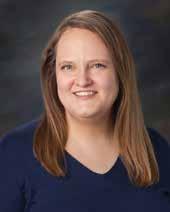 By Sarah Lerohl
By Sarah Lerohl
2020 was unlike any other — in a million different ways. As the budding COVID-19 pandemic shut down traditional entertainment venues and general insecurity mounted about food availability, residents turned toward home gardening for entertainment, stress relief, fresh food and bright blooms.
A whole new crop of gardeners cultivated seeds of curiosity and harvested a healthy new pastime, along with the rewards of the growing season. Now, it’s time to harness that excitement and keep the enthusiasm going into this season.
New urban gardeners often choose raised bed gardens — an elevated box filled with enough soil to support plants without using the soil beneath the box — as they offer some tantalizing benefits. Raised beds provide well-defined garden boundaries for lovers of order (and help keep plant diseases from
spreading). They allow gardening on sites where soils may be unsuited for gardening, and best of all, raised beds can make gardening much more comfortable by limiting the bending required to get into the dirt. Since raised beds are filled by the gardener with the desired soil substrate, they often have better soil structure and drainage than the surrounding earth and they will certainly warm up more quickly in the spring.
No matter your preference, whether in the native soil or above it, your best bet for great quality dirt always begins with a soil test. University of Minnesota Soil Testing Laboratory (soiltest.cfans.umn.edu) provides detailed instructions for taking samples at home, submitting them and interpreting the results when they are returned. Soil quality is key for continued success.
Garden Green compost is produced in Duluth from local food scraps and yard waste, providing a stable source of organic matter for raised beds and traditional gardens.

Garden soil characteristics change over multiple growing seasons, even in raised beds, with the slow breakdown of soil particles and organic matter — the part of soil made from dead plants and animals — and as plants uptake nutrients. Even if you built raised bed gardens and filled them with the exact type of soils required for the plants you grow, things change. If you started a pandemic garden without soil testing, no problem, it’s never too late. If it’s been a few years since testing in a well-established plot, take the time to do one this year. Results will help you understand what, if any, fertilizers or soil amendments are needed.
A recent study out of Oregon State University found that some urban gardens actually contain too much organic matter, and that can pose problems. It can be tempting to add more organic matter than is necessary because manures and composts can be obtained easily at most garden centers, but your first concern should be the inorganic part of the soil, the mineral portion ultimately made of broken down rocks. The minerals and nutrient byproducts of breakdown provide the building blocks the plants need to build tissue. The inorganic particles create the basic structure of the soil that helps to root plants and make water available.
Organic matter helps the plants access all the inorganic goodness by “opening up the soil,” making space and room for tender roots to penetrate. Organic matter acts as a juicy sponge, retaining water within the soil structure, and will very slowly add further nutrient content as it breaks down. The

presence of organic matter brings all the “critters to the yard,” providing ample fuel for a vibrant soil community of bacteria, fungi and other organisms that boost fertility.




The risks associated with adding excessive organic matter, like “burning” plants with extra nutrients, are minimized when using a thoroughly composted, stable product like WLSSD’s Garden Green compost, but gardeners are wise to remember that it is possible to have too much of a good thing.
There aren’t hard-and-fast rules for how much organic matter soils contain, but the U.S. Composting Council recommends aiming for 5% to 10% in your home veggie or flower beds. Organic matter can be added to your garden in the form of homemade or commercial composts made from yard waste, food scraps, manure, or a combination of feedstock. Top dress existing gardens with compost as recommended by your test results, and plan on adding a couple of inches annually going forward.




As amazing as compost is, plants cannot grow on compost alone — but soil blended with compost? That’s a recipe for success. Learn more about the best blends of soil and Garden Green compost for your project at wlssd.com. D
Organic matter is an important component of soilhealth. Soils can be amended regularly with compost to ensure soil health.
"Rightnow is probably the best time in our lives,” said Sue Ann Dumke, co-owner of the Brule River Farm, north of Brule, Wisconsin.
Dumke had always dreamed of living in northern Wisconsin. She fell in love with its beautiful woods and lakes by spending summers at her grandparents’ home on Webb Lake in Northwestern Wisconsin.

Growing up in Dundee, Illinois, outside of Chicago, Dumke described herself as a suburban girl whose only experience with farming was the garden her father kept in the backyard. Despite this, she had a goal of living a sustainable, self-sufficient lifestyle involving growing her own food.
Dumke’s husband, David, is from a family of farmers and
shared the same dream. The two met in Dundee through community theater.
“When we got married, one of our big connections was that we both wanted to live in northern Wisconsin,” Dumke said.
The couple purchased the land that would become Brule River Farm in 1978, building it up year after year into the successful business it is now.

“We found this beautiful combination of field and forest near Lake Superior and the Brule River. For us it was this perfect place, and we still feel that way.”
The farm sits on 111 acres, 76 of which are wooded and used for firewood and maple syrup. The remaining 35 acres consist of a hay field that the neighbor maintains in exchange for manure and roughly seven fenced-in acres for farming.
The farm began as more of a garden, producing enough

to feed the Dumkes and their three children. In the ’90s, they began doing small farmers markets as a family as a way for the kids to make some extra money.
“Actually, they really got all the money from those days,” Dumke joked.
The year 2000 was a turning point for the farm. Their farmers markets with the kids showed there was a demand for locally grown, garden fresh food. The Dumkes saw this potential and began investing in the farm to increase production and become more efficient.
Weather is one of the biggest challenges for farmers, especially with Wisconsin’s short growing season, so the Dumkes began to look at ways to mitigate the unpredictable elements.

This involved investing in three high tunnels — big hoop houses 12 feet high, 96 feet long and 26 feet wide. These structures are more weather controlled, so they use them to grow more sensitive crops like tomatoes, peppers and melons.
The Dumkes have also invested a lot of time and energy into soil management, as the farm sits largely on red clay from Lake Superior.
“We really have to do a lot of soil
amending,” Dumke said. “We are basically making soil that we are building up on top of the clay.”
The next turning point came in 2008 when Dumke made the decision to leave her job to pursue farming full time. Up until that point, both Sue Ann and David had been working
Environmentally conscious growing practices including compostable containers
•Classic &hard-to-find bedding plants, including awide variety of succulents
•Heirloom &traditional tomatoes, vegetables &herbs
•Custombaskets &container designs
•Pollinator garden plants
•Manyperennials, fruits, organically grownvegetables



Located North of Duluth offLismoreRoad

Soils/Dirt •Garden Blend/


Dirt
Dirt






day jobs during the week and hitting up farmers markets on the weekends.
Dumke had been working as a special education assistant for the Superior School District, so she had summers off, but she would have to go back to work in the height of harvesting season.
The Dumkes’ oldest son, Jacob, had a severe disability due to an illness he suffered as an infant, and in 2008 he was admitted to Solvay Hospice House in Duluth, which was another consideration for Dumke leaving her job.


“I had Jacob and the farm and my job, and I just needed to be my own boss to be able to prioritize my time so that if I needed to be with him, I could just drop everything and be there.”
Retiring was difficult for Dumke, as she loved her job and the people she worked with, but she was confident that it was a good business move and that they could produce enough to replace her income.
The farm has slowly grown every year since then, but has yet to max out on production. They grow several varieties of tomatoes and peppers, melons, and typical garden vegetables for the area: cucumbers, beans, peas, squash, cabbage, broccoli, cauliflower and carrots.
The trees play a big role, too; they have apple trees for fruit and cider, maple trees for syrup and they use logs from the woods to grow mushrooms.
“Working on the farm can be all-consuming,” Dumke said. “You can start when it gets light out and quit when it’s too dark to see the difference between the weed and the carrot, and there’s still more to do.”
The pace slows in the winter months, but there is always something to be repaired, cleaned, canned or stored.




“You look at farming, especially vegetable farming, thinking it’s six months through the spring and summer and fall, but it takes much of November to just get everything cleaned up and put away,” Dumke said.

Dumke finds the hard work fulfilling and rewarding and is grateful for the community’s support of the farm to keep the couple doing what they love.
“We are living the dream right now,” she said. “It’s this tremendous sense of gratitude that we were able to acquire this land, that we ended up in this one spot in the whole universe where we feel like we were meant to be when we moved here 43 years ago.”
You can find Brule River Farm products this year at the Barker’s Island Farmers Market, open Saturdays from 9 a.m. to noon, May 22 through Oct. 30 and the Superior Downtown Farmers Market, open Wednesdays from 11 a.m to 2 p.m., May 26 to Oct. 27. You can also follow their Facebook page — Brule River Farm. D
More than a dozen years ago, a Duluth teacher would go for walks in the Kenwood area near her school, and she imagined how wonderful it would be to live in that beautiful and friendly residential area.
In 2008, it became reality when she and her husband built a new home just outside the Kenwood neighborhood for their growing family — they had one son and another on the way. It was like a dream come true and they lived in that home for 11 years.
As they neared the 11th year, however, the property next to them became available and they purchased that land — a 2-acre lot with mature maple trees. The wife enjoyed coming up with design ideas, and before they knew it, they had plans for building a new house on this property.
“The location is convenient,” the husband explained. “It’s close to work, close to family. It has a private feel and large lots. It ends on a cul-de-sac with low traffic.”
“My mind is always going to colors and designs, so it was either
The living room in this Kenwood home features a fireplace covered in glacial stone set against a dark accent wall. Natural light floods the space. BELOW: Stairs lead down to a rec room, two bedrooms with a large bathroom and additional laundry space for the kids.


remodel that house or go with something new,” she said. “We did everything on our own. We picked all the paint colors and designs.”
They hired architectural designer Heather Hiner and general contractor Jeff Nelson (who is also a close personal friend of the husband). Nelson and his father built the couple’s previous home, and the quality of their craftsmanship is outstanding, the couple said, so they chose to go with him again for their new dwelling. Nelson’s sister Shelly also helped select some lighting and made some interior color selections for this new home.
“Having a friend build something so important certainly added a layer of comfort, and we are very grateful for the extra care he put into this project,” the husband said.
Construction began on their new
home in November 2019 and the family moved in July 2020. They love their wooded surroundings and their new home, designed to suit their every need and desire.


“We were very thoughtful in the layout of our house,” the wife said. “It’s perfect for us.”
Other advantages to building next door are that the boys can stay in the same schools and keep their neighborhood friends, the husband said.
The home has a full upstairs with a partial basement.
“It’s sort of a ‘modern farmhouse’ style,” the husband said, “but it’s a little different in the sense that it’s mostly black with white accents.”
The more traditional modern farmhouse exterior is white with black accents, but this couple wanted a more unique look.
“When we told people that the house was going to be black,
The interior of the home features 22-foot ceilings in the living room, which is flanked by two walls of frameless, recessed windows that give the home a modern, industrial look.

we got some surprised looks,” the husband said. “It’s really quite stunning. We see cars stopping and people shout, ‘We love the house!’”
“This project was unique in that the homeowner wanted an eclectic style — something modern with a mix of materials and siding,” Hiner explained. “Initially we discussed a shed roof, but in the end we went with more traditional gable rooflines and modernized the look with a shed roof over the porch, varied siding colors and patterns, and large windows.”
Continued on page 42-44

"Gemini Designs was very easy to work with. Nicole listened to our wishes and preferences and helped build a functional kitchen that was designed around our application selection. We wanted a bright and welcoming space both for our family and for entertaining and this design came through perfectly. It balances practical storage and counter space with the elegance of some open shelving and lighted display spaces."





— Homeowner


All doors inside the house are black — the opposite of the traditional modern farmhouse, which features white accents throughout the home. The wife said that she found this “opposite” farmhouse trend as she looked at design themes and photos online.


“I started finding some modern farmhouse themes with black,” she said. “It was different. I don’t think we’ve seen a house in Duluth with so much black. We just kind of gave that theme to the architect to weave into the design.”
Inside the house, the design of the living room and dining room is open-concept. Living room ceilings are 22 feet tall. Frameless windows with no trim boards are recessed into the walls and give a modern, industrial look.
“Previously the homeowner lived next door, and one thing they disliked was the lack of sunlight in the living areas that faced the backyard to the north,” Hiner said. “So their request for this home was to make sure that the living areas received plenty of southern sunlight from the street side, yet had views of the
Continued on page 46







backyard to the north. The design solution was a great room on the end of the home with tall windows facing the backyard to the north with a symmetrical wall of southern windows facing the street that floods the adjoining open-concept dining and kitchen with all-day sunlight. The sunny interior is enhanced by the soothing palette of colors and materials that make the home feel like a retreat.”
“We did a grey glacier stone covering on the fireplace,” the husband said. “An accent wall painted in ‘Iron Ore’ gives nice contrast.”

In the living room is a sitting/reading area with comfortable chairs, and a 9-foot door opens out to deck space. In the dining room is a distressed parrot wood table with iron supports under



PH: 218-722-6354
Website: www.krausehe ating.com

EST: 1982
Phone:2 18-499-8636
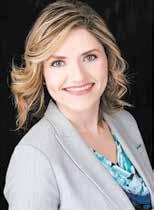

70 7HWY 33 Suite #11C loque t olsoninsuranc ellc .com



the table and for the chair legs.
“No two slabs of the wood are the same,” the husband said.
A powder room is conveniently set off these rooms with a vessel sink, Iron Ore painted walls, gold hardware and mirror, and patterned tile floor.
The kitchen was designed around its Café brand Matte White appliances with brushed bronze handles and accents.

“When I saw them, I had to have them,” said the wife, and the husband was more than pleased to get the chef’s kitchen of his dreams with the Advantium Wall Oven.
“It’s really amazing,” he said. “I can cook a 6-pound chicken in 13 minutes. They call it the ‘Jetson Oven.’”
The kitchen also features a center island in a lovely blue color, tiling in an interesting pattern, a backsplash in an angular herringbone pattern, and ceramic tile behind the stove. The island includes a wine fridge. Another highlight of the kitchen is the large pantry with cabinets and countertop powered for plug-in appliances, so they don’t take up countertop space.
Conveniently, the kitchen includes an office space with double barn doors.
“It’s been great during COVID when we work from home,” the husband said.
Off the kitchen and next to the garage is a large mudroom with shiplap siding and coat hooks.
The master suite includes a large walk-in closet, women’s makeup area, and master bath with double shower and freestanding tub. Off the master bathroom is a workout room where the husband and wife exercise every morning. An outdoor patio area is accessible from there. A barn door opens to the master bath, and another barn door opens from the master bath into a laundry room.
“It’s all tied together nice and close,” said the wife, who came up with the idea for these rooms to be located together on one end of the home.
Immediately downstairs is a rec room with a big wall-mounted TV, the bedrooms of the couple’s two sons, ages

17 and 11, and a large bathroom with a jacuzzi tub. There is a separate laundry closet just outside the downstairs bathroom. The parents say the boys do their own laundry there.
Continued on page 48


218-626-1625
9830 Grand Avenue Duluth, MN 55808
The couple loves their new home, inside and out.



“The views are just spectacular,” the husband said. “It definitely feels like you’re in the country. We kept a lot of the trees untouched, and wild grass covers the canopy of the hills.”
“I feel very blessed,” the wife said. “I’m very grateful. This is a beautiful house and lot.” D

Alison Stucke is a Duluth freelance writer.


To maintain the privacy of the homeowners, names have been withheld.





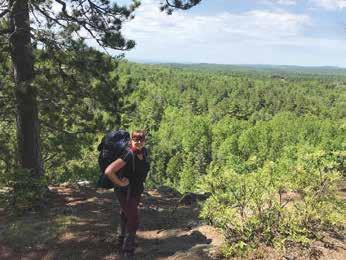
Do you want to explore more of the outdoors this season? Is there a certain trail you want to hike but feel intimidated by it? Or are you a beginner backpacker and don’t know where to start? Then read on! The Northland offers a wide variety of trails for everyone to explore. Whatever draws you to venture out and explore the great outdoors, here are some key factors to consider before heading out, including what to pack, what to wear, and where to go.
If you’re just starting out, begin with a shorter hike and work your way up to longer hikes. First, look at the weather ahead of time and pack accordingly.
“If I'm going to go out on a long day hike, what I bring depends both on the season and the conditions I expect to find,” said Anna Swarts, experimental educator with Community Education. “I think that the 10 essentials are a good place to start: navigation, sun protection, insulation, illumination, First-Aid supplies, fire starters, repair kit

and tools, nutrition, hydration, and emergency shelter.”
Shannon Benolken, an avid hiker, said navigational knowledge is imperative.
“Make sure you know how to use your compass as it’s easy to lose a trail while hiking. Deer trails intersect, or you get to talking with your friends and then you realize you went past your marker.”
Water is another essential item.
“I carry a filtration system with me, just in case,” she said. Get footwear with good traction and break them in by wearing them prior to a long hike.
"I'd recommend wearing whatever shoes, socks, clothing, and packs you plan to wear while hiking on walks somewhere close to home so you can assess if there will be any blisters or chafing before you get out on the trail,” Swarts advised.
Also be sure to pack some food.
“I'm a big fan of snacks,” Swarts said. “I usually like to bring plenty of salty ones, especially on backpacking trips, because most granola or energy bars are pretty sweet.”
Equipment for backpacking will include everything you considered for a day hike plus additional items.
“Overnight I'll bring a sleeping bag and pad, a tent, a stove and pot, more food, and some way to store it safely,” Swarts said.
When hiking, every ounce matters.
“Some folks choose to go lighter weight by leaving stoves at home, but I like to have a hot meal at the end of the day,” she explained.
When sleeping on the ground, a sleeping pad is a must, as it provides comfort and warmth. Sleeping pads are measured by
the R-value, which is the pad’s ability to resist heat loss to the ground.
“Another option is to hammock hike and sleep in them,” Benolken suggested. She also prefers a sleeping quilt over a sleeping bag because they are lighter and allow for more movement.
A bear-proof container for your food is essential.
“I use an Ursack, a bear-proof bag. It’s made of a Kevlar material, so it’s super strong,” Benolken explained.
Along with a container, you need to have a garbage bag.
“Leave no trace. Whatever you pack in, you have to pack out,” she said.
“Another crucial bit of gear that I'll throw in, in all seasons other than winter, is a head net for bugs. It can really make a huge difference in enjoyment, and it doesn't take up much space,” Swarts advised.
Want to go backpacking for a week? Benolken explained that anything over a five-day hike will take extra planning.
“You can carry three to four days’ worth of food. Anything over that and you need to start thinking about drops and resupplying,” she pointed out.
Benolken often hikes with her Rhodesian ridgeback, Angus.
“You don’t want to go any distance until they’re at least a year old. Their joints are still growing and the pads of their feet will get sore,” she explained.
Other factors to consider are how long of a distance you are going and the fitness level of your companion.
Dogs must be kept on a leash on the Superior Hiking Trail (SHT) and in Minnesota's State Parks.
“Rules clearly state that all dogs must be on a leash,” Benolken said. “Just because your dog is friendly and lovable,

doesn’t mean that other people want them by you. They may have a fear of dogs.”
Along with a leash, you will want to bring food, a water dish, and doggie bags.

“I’ll bring some kibble for him. I’ll share dog-friendly human food, as well. And when I stop to rest, he rests, too,” Benolken said.
A collapsible water bowl is handy as well, especially if there is not easy access to water.

“And don’t leave the doggie bag on the trail!” she added. Where to hike

“I love hiking the SHT in Duluth,” Swarts said. “There are a lot of really cool sections in the southern part of the trail that are often overlooked.”
For beginner backpacking, Benolken suggests starting out at a state park.
“They’re extremely well-marked. You can learn your directions and how to read your map. Plus, they’re state parks for a reason; absolute gorgeous place to be,” she said.
Whether you choose a longer day hike or backpacking trip, make sure you are prepared.
“If you're not feeling confident with your skills, sometimes gear stores or community education programs will offer classes, which can help you connect with other hikers in your area,” Swarts suggested.
For a beginner, hiking with someone is always a good idea. And no matter what, tell someone about your plans.
“Make sure to tell someone back home what your plans are,” cautioned Swarts, “so they will know when and where to send help if needed.” D


When looking at fun, springtime art projects, we stumbled upon this cute idea of making flowers with paw prints. Thinking “This will be easy!” was perhaps a little presumptuous. We thought we'd be able to make one pawflower with each of our dogs’ paws; however, we ended up using just one pup. It's an adorable project, actually quite sweet once finished!
When dealing with your pets, some things are a bit more challenging! Megan's dog Sasha was the subject of this fun art project. Lucky for us, she loves to lay on her back, which made this a lot easier. We lightly painted her little paws with washable paint, placed a piece of paper on a hard-covered book and then pressed her paw firmly in place on the page.
After a few tries, they turned out just adorable. We painted a little flower stem to complete the look of paw-print flowers. We decided to frame this cute little art project as a great memory of Sasha.

"I highly recommend this project — though it can be a challenge — it's really fun to do. It’s like going back in time for art class in school," Keller said.
"I saw a version of this on Facebook and immediately thought it looked super fun to try! I used Crayola washable paint and it came off the paws super easy with a little water and wash rag," Carlson said.

Tips:
• Do not overpaint your pup’s paws — a little goes a long way. I thought it needed to be coated, but a lot of paint gets into the paw fur and then creates a big smudge on the paper.
One variation is to do this with your toddler's hands and feet, and turn them into flowers or, like a co-worker's grandson, a spaceship!
• Have something sturdy and flat to place under the paper to help get even pressure and coating when making the paw print.
• If you have multiple “models,” let your paint dry in between. It is much easier to avoid smudging.
• Treats are a must. All participants deserve a reward for their cooperation!
• You can also do this with your toddler’s handprint or footprint(see photos). D



Water soluble paints (safe for pets)
Paint brush Paper
Ingredients
½ cup panko bread crumbs
½ cup Shore Lunch breading mix, original flavor
⅛ cup Shore Lunch breading mix, cajun flavor
2 eggs
Walleye fillets (or freshwater fish: sunfish, perch, )
Vegetable oil
1. In a wide bowl or shallow baking dish, combine bread crumbs and Shore Lunch flavors. Optional: run the ingredients through a food processor to make the crumbs finer.
2. In another shallow dish, beat eggs.
3. Pat walleye fillets dry.
4. Pour vegetable oil into a cast iron skillet until the bottom is covered; heat over medium high heat.
5. Meanwhile, dip fish in egg and then coat in bread crumbs. Gently set coated fish fillets into hot oil and fry

It's that time of year! Tackle boxes are getting dusted off and organized for the summer fishing season. The Woman Today staff thought it would be fun to share our favorite fish recipes and so did Mount Royal Marketing. So, once you've caught all those beautiful fish, have fun trying one of our recipes.
until medium golden brown in color, flip and cook until the second side is golden brown.
6. Transfer fish to drain on paper towels.
1. You may keep the cooked fillets warm by placing them in a 250-degree oven.
2. The coating will “dirty” your oil and continue to cook and burn with subsequent batches, so I’d recommend scraping out the leftover oil and starting each batch with fresh oil.
Provided by Mount Royal Market, Deli
Ingredients
White Fish
Salt & pepper
Grape seed oil
Sicilian Stew
2 cups baby red potatoes, ½’’ dice
1 serrano pepper, sliced thin
1 red onion, julienned
1 red bell pepper, julienned
2 garlic cloves, minced
1 celery rib, diced
1 fresh rosemary sprig
Herb Lemon Butter
White Fish w/Saffron Rice

Provided by Mount Royal Market, Deli


Ingredients
White Fish
Salt & pepper
Lemon slices (thinly sliced)
Herb Butter
¼ cup butter, melted
1 ounce garlic, minced
¼ bunch parsley, chopped
1 Tbsp. thyme, chopped
1 tsp. rosemary, chopped
Lemon zest

¼ cup fresh thyme
½ cup white wine
1 cup chicken stock, or as needed
½ cup chorizo, diced
Instructions: Season white fish and sear both sides until golden brown. Saute peppers, garlic, onion and celery until translucent. Add herbs and diced potatoes and cook on low heat until potatoes become fragrant. Stir in chorizo.
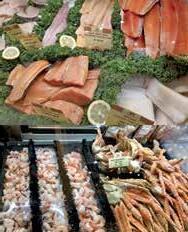

Saffron RiceRice Cooker
1 cup jasmine rice
2 cups chicken stock
¼ tsp saffron



½ cup dried chives
1 Tbsp. butter
Instructions: Place white fish in a nonstick or oiled baking pan. Pour or brush herbed butter over seasoned white fish. Place lemons on top of white fish. Bake in an oven set at 325-350 degrees for 10-15 min. Serve over saffron rice.
Deglaze with wine and add stock. Reduce until starches in potatoes release and bind mixture.
Ingredients
Lake trout fillets
Olive oil
Old Bay Seasoning
Black pepper
Leeks, sliced and drizzled with olive oil
Fresh fennel fronds, snipped
Instructions:
In a shallow broiler pan, place trout fillets on foil, skin side down. Brush top side lightly with olive oil. Season with Old Bay Seasoning and black pepper. Place leeks on top of fish. Bake at 350 degrees for 10-15 minutes. Remove from oven and sprinkle fennel fronds on top.

Ingredients
1 cup pancake mix
3-4 eggs
1 cup Saltine crackers (I like Zesta)
Northern, walleye, crappie, sunfish or perch fillets

Margarine and Vegetable oil
Kitchen tools:
Three shallow bowls (one for each dipping ingredient)
Electric skillet
Platter (to put the dipped fish on)
Instructions:
1. Crush your saltine crackers or run through a blender to make finer crumbs. Pour into one of the shallow bowls.
2. Beat the eggs in a second shallow bowl.
3. Pour the pancake mix in a third.
4. The order of dipping the fish is pancake mix, egg and then saltine crumbs. I use kitchen tongs to dip in the separate toppings, otherwise my hands get all gooped up with batter. Once all the fish are dipped in the toppings, it’s time to fry!
5. I like to do a mix of margarine and vegetable oil. Start
with a half stick of margarine and about 3 tablespoons vegetable oil. Set your skillet to about 375 degrees. Once the margarine is melted and starts bubbling carefully start laying your fish fillet in the skillet.
6. Fry until golden brown in color, flip and cook until the second side is golden brown.
7. Transfer fish to drain on paper towels.
8. I like to experiment with different toppings too. Replace the saltines with crushed Doritios, pretzels, Cheetos or any of your favorite flavored chips.
 By Ali Carlson
By Ali Carlson

1 quart cool water
1/3 cup Diamond Crystal kosher salt, about 2 ounces of any kosher salt
1 cup brown sugar
Instructions:
Mix ingredients and brine at least overnight-We left fish in the brine for about 24 hours, the longer you brine it the saltier the fish. After you remove from brine, pat dry and put back in the fridge to “dry”. This process creates a sticky surface of the fish and should take 2-4 hours.
Set the smoker to 140 and start your fish for a couple of hours. Then increase the temperature to 170 for the last 2 hours-time will vary depending on how thick fish is. You are looking for an internal temperature of 135.

Once you take your fish out of the smoker, let it rest for about an hour before you store in refrigerator.
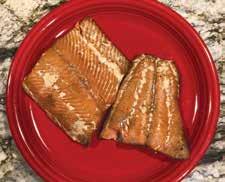
For the salad this is where you can have fun! There is no recipe to the salad, the ingredients are whatever you enjoy. My favorite lettuce is chopped romaine so I used that as my base. I also included chopped cucumbers, hard boiled eggs, cranberries, sunflower seeds and croutons. My dressing preference is balsamic vinegar, but, I think you could use whatever you prefer.
My toppings also depend on what is in season. In the summer my salads generally include more berries, fresh pineapple or even mandarin oranges.

** Follow the Safe-Eating Guidelines at www.health.state.mn.us/fish to choose fish low in mercury and other contaminants. **












